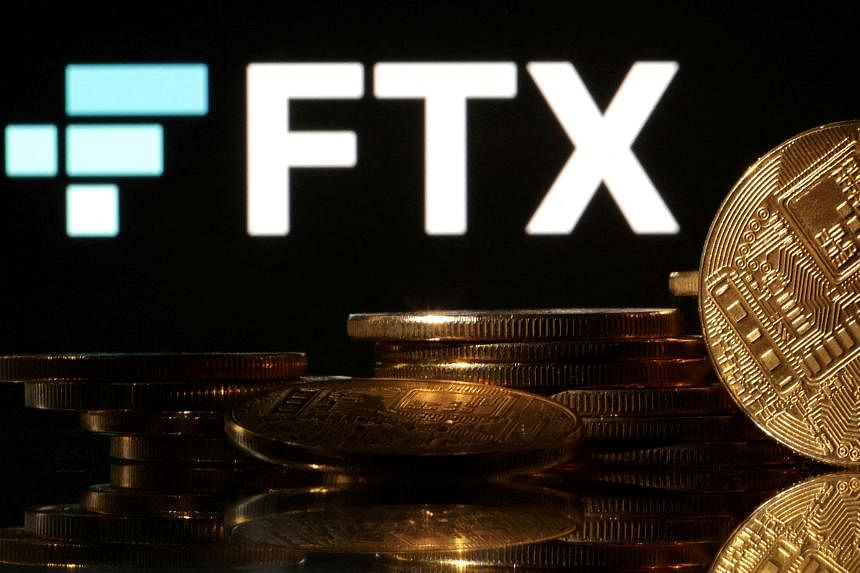NEW YORK – Mr Sam Bankman-Fried’s crypto empire, FTX, was an epic mess and the unwinding is likely to last longer than the empire itself.
Crypto companies, investors and government officials who heard policy pitches and pocketed political donations from the FTX founder, who is commonly known as SBF, are reeling.
The Ontario Teachers’ Pension Plan said last Thursday that it was writing down a US$95 million (S$131 million) investment in FTX. Coinbase, the only publicly listed crypto exchange in the United States, has seen stock and bond prices fall as the digital asset industry struggles. Crypto values, which fell dramatically over the summer, have dropped further.
FTX owes its 50 biggest unsecured creditors a total of US$3.1 billion, according to court papers filed on Saturday, and its new management has found just a fraction of the firm’s crypto assets.
At this stage, there are many more questions than there are answers about what the reverberations of FTX’s collapse will look like. Here are three of the biggest:
Who is next?
Crypto companies are deeply intertwined – they invest in one another, buy one another’s tokens as well as lend tokens and capital to one another – which means the collapse of FTX could topple others.
Crypto lender BlockFi, which signed a deal to be rescued by FTX when crypto prices nosedived over the summer, paused withdrawals last week and is preparing for a possible bankruptcy. BlockFi said it had “significant exposure” to the failed exchange and FTX’s trading arm, Alameda Research.
Industry insiders expect more companies to follow suit.
Two restructuring advisers told DealBook that Oxygen, a decentralised finance lending and borrowing platform backed by Alameda, was on their watch lists. Oxygen’s token is OXY; its total market capitalisation, which was about US$395 million in January, has fallen to about US$2.6 million.
Genesis Global Capital, one of the largest lenders in the crypto space, suspended withdrawals and new loans last Wednesday. Genesis, which may have lost as much as US$175 million in the FTX collapse, is struggling to pay back creditors.
Genesis is connected to many other firms. Its parent, Digital Currency Group, owns publication CoinDesk and investment firm Grayscale, a substantial crypto holder, among other entities.
Is SBF going to prison?
“That is the million-dollar question. Everything is on the table,” said Mr Joe Rotunda, director of the enforcement division of the Texas State Securities Board, which began investigating FTX before its collapse.
The complexity of the international FTX empire, messy record-keeping, unreliable statements and the anonymous nature of transactions on the blockchain complicate matters for investigators and prosecutors building cases. They need to do forensic audits and resolve jurisdictional issues.
“Bad investments don’t necessarily mean prison. The big one is fraud. That is the big hammer,” Mr Rotunda said. “Concealing or lying. Words and conduct. There is a duty to truthfully disclose.”

Mr Bankman-Fried also faces civil litigation from small investors as well as big backers and venture capitalists, who began developing strategy with lawyers even before the bankruptcy – and expect to face claims themselves from their limited partners.
“The civil suits will come before the criminal suits,” said Mr Paul Foley, a securities law expert at the law firm Akerman. “Anyone who invested in FTX would have a lawsuit. But it is a lot more difficult to make a criminal case than a civil case.”
Will the FTX collapse prompt more regulation?
Congressional committees and government agencies in the US had already been investigating FTX or are now calling for inquiries. Last Friday, the House Subcommittee on Economic and Consumer Policy sent a letter to FTX’s current and former chief executives requesting information on “the full scope of harm inflicted upon its investors”.
The House Financial Services Committee (FSC) and the Senate Banking Committee have announced hearings on the FTX debacle, and are also likely to address new rules and a pending Bill. Stablecoins – cryptocurrencies ostensibly pegged to the value of a dollar – are the subject of legislation languishing in the FSC. The Bill, which would ensure that stablecoin issuers were overseen more as banks are, could get a renewed push.
One complication is that, until recently, Mr Bankman-Fried did a lot of lobbying in Washington and was a champion of the legislation, testifying before the committee, wielding influence behind the scenes with congressional staff and publishing a related policy statement on Twitter.
“Anything he has been pushing policywise will be reassessed,” said Mr Lee Reiners, a financial technology expert at Duke University Law School, who was formerly at the Federal Reserve Bank of New York.
Another is that Mr Bankman-Fried was a major political donor, contributing around US$37 million to Democratic candidates in the last election cycle. His co-chief executive, Mr Ryan Salame, was a major Republican donor, giving more than US$20 million. In all, FTX executives contributed nearly US$72 million to both political parties, and the company was strategically bipartisan in its lobbying and government affairs hiring.
Politicians on both sides of the aisle are regifting the funds. Senator Kirsten Gillibrand (Democrat), who co-sponsored a crypto Bill that Mr Bankman-Fried supported, and Representative Kevin Hern (Republican) are among those who said they would donate the funds to charity.
Regardless of the politics, the collapse of FTX is likely to spur action, and some crypto companies that see regulation as key to legitimacy would welcome it. NYTIMES

